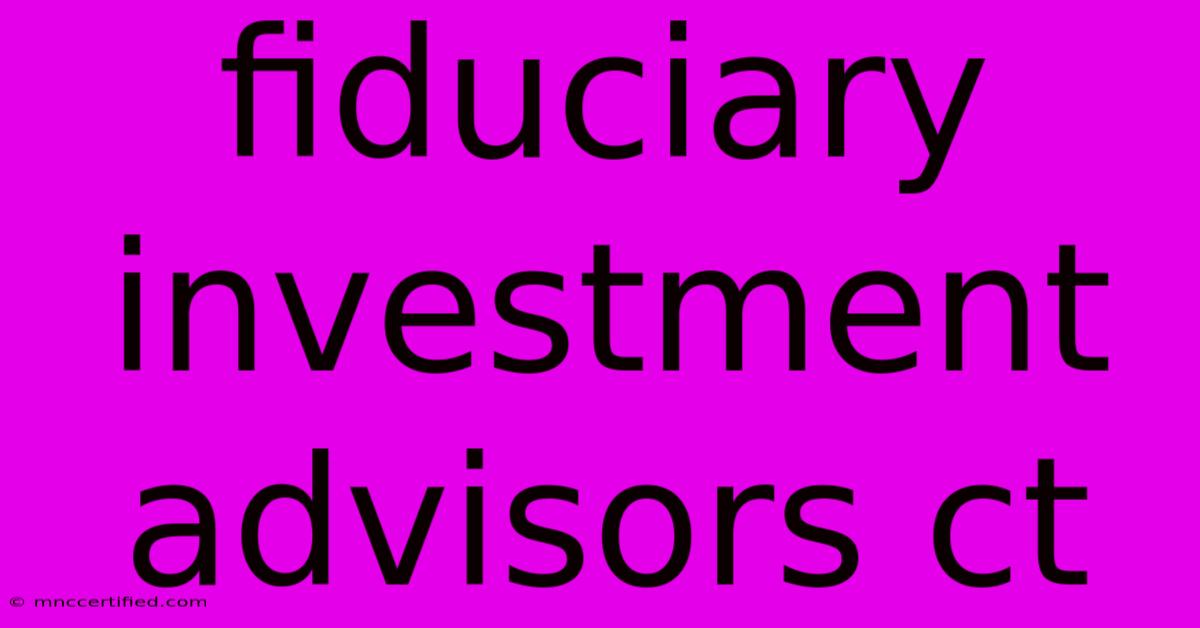Fiduciary Investment Advisors Ct

Table of Contents
Finding the Right Fiduciary Investment Advisors in CT: A Comprehensive Guide
Choosing a financial advisor is a crucial decision, especially in Connecticut, where diverse investment opportunities and financial complexities exist. This guide helps you navigate the landscape of fiduciary investment advisors in CT, ensuring you find a professional who prioritizes your best interests.
What is a Fiduciary Investment Advisor?
Unlike other financial advisors, a fiduciary advisor is legally bound to act in your best interests. This fiduciary duty means they must prioritize your financial well-being above their own profits. This commitment is enshrined in law and enforced through regulations. This is a critical distinction, as other advisors may operate under a suitability standard, meaning they only need to offer investments suitable for you, not necessarily the best options available. In Connecticut, understanding this difference is paramount to making informed financial decisions.
Key Differences: Fiduciary vs. Suitability Standard
| Feature | Fiduciary Advisor | Suitability Standard Advisor |
|---|---|---|
| Legal Duty | Bound by law to act in your best interest | Required to offer suitable, not necessarily best, options |
| Transparency | Full disclosure of fees and conflicts of interest | Less stringent disclosure requirements |
| Investment Choices | Prioritizes your goals above all else | May prioritize products that benefit them more |
Finding Reputable Fiduciary Investment Advisors in CT
Your search for a fiduciary investment advisor in Connecticut should be thorough and meticulous. Consider these steps:
1. Check Credentials and Licensing:
- Verify licenses: Ensure your potential advisor holds the necessary licenses and registrations with the Securities and Exchange Commission (SEC) and the Financial Industry Regulatory Authority (FINRA). You can easily verify this information online.
- Certifications: Look for certifications like Certified Financial Planner (CFP®) or Chartered Financial Analyst (CFA®). These designations indicate advanced training and commitment to professional standards.
- Background Checks: Use resources like FINRA's BrokerCheck to review the advisor's background and check for any disciplinary actions.
2. Clarify Fees and Compensation:
- Transparency is key: A true fiduciary advisor will openly discuss their fee structure. Understand how they are compensated – whether it's through fees, commissions, or a combination. Hidden fees are a significant red flag.
- Fee-only vs. Fee-based: Choose a fee-only advisor to avoid potential conflicts of interest arising from commissions.
3. Assess Investment Philosophy and Approach:
- Alignment of Values: Find an advisor whose investment philosophy aligns with your risk tolerance, financial goals, and investment timeline.
- Investment Strategy: Discuss their approach to asset allocation, portfolio diversification, and risk management. A robust investment strategy should be tailored to your specific needs.
4. Seek Recommendations and Reviews:
- Network: Ask trusted friends, family, or colleagues for recommendations. Word-of-mouth referrals are often invaluable.
- Online Reviews: Check online review platforms like Yelp or Google My Business to gauge the experiences of other clients. Be mindful, however, that reviews are subjective.
5. Conduct Thorough Interviews:
- Ask Questions: Prepare a list of questions to assess their expertise, experience, and understanding of your financial situation.
- Evaluate Communication: Choose an advisor with whom you feel comfortable communicating openly and honestly. Effective communication is essential for a successful advisor-client relationship.
Benefits of Choosing a Fiduciary Investment Advisor in CT
Engaging a fiduciary investment advisor in CT offers several significant advantages:
- Conflict-Free Advice: You receive unbiased recommendations tailored to your specific financial goals.
- Protection of Interests: Your advisor is legally obligated to act in your best interests.
- Long-Term Financial Planning: They will help you develop a comprehensive financial plan to achieve your long-term goals.
- Transparency and Accountability: You can expect clear communication and a full understanding of fees and investment strategies.
Choosing the right fiduciary investment advisors in CT is an important step in securing your financial future. By carefully following these guidelines, you can find a trustworthy professional who will guide you towards achieving your financial goals. Remember to always prioritize transparency, thorough due diligence, and a comfortable working relationship.

Thank you for visiting our website wich cover about Fiduciary Investment Advisors Ct. We hope the information provided has been useful to you. Feel free to contact us if you have any questions or need further assistance. See you next time and dont miss to bookmark.
Featured Posts
-
Global Response To Netanyahu Gallant Icc Arrest
Nov 22, 2024
-
Nc States Loss 3 Key Takeaways
Nov 22, 2024
-
Marsico Funds Investment Reviews
Nov 22, 2024
-
Horse Insurance For Older Horses
Nov 22, 2024
-
Bed And Breakfast Insurance Cost
Nov 22, 2024